La Spezia, extraordinary discovery? No, glaring blunder: the papers on Dante "found"-they are strange!
An extraordinary discovery at theState Archives of La Spezia? So in the past few hours, Sunday, December 8, several newspapers have headlined referring to the alleged discovery of documents concerning Dante Alighieri in the La Spezia archives: it would be, as we read in Ansa, which quotes La Spezia Mayor Pierluigi Peracchini, “two pages of the first edition of the Divine Comedy” that were allegedly “found during the transfer works of the La Spezia State Archives” and the “original of the Pax Dantis”that is, the Peace of Castelnuovo (or “Dante’s peace”) signed on October 6, 1306, in Castelnuovo Magra between the Malaspina family, represented by Dante Alighieri (who therefore dressed in diplomatic garb on that occasion), and the bishops of Luni at the end of a war that had pitted them against each other. Exceptional news? Not at all: a resounding blunder! In fact, the documents whose photographs were published are well known, have been the subject of studies, publications, in-depth studies, and even exhibitions.
Even, in some newspapers there has been talk of the "original pages of the Divine Comedy," with an emphasis that may lead readers to further misunderstand and believe that nothing less than the sheets penned by the hand of Dante himself have been found on the shores of the Gulf of Poets. In that case it would indeed be an extraordinary discovery, but unfortunately this is not the case. Let us see how things stand.
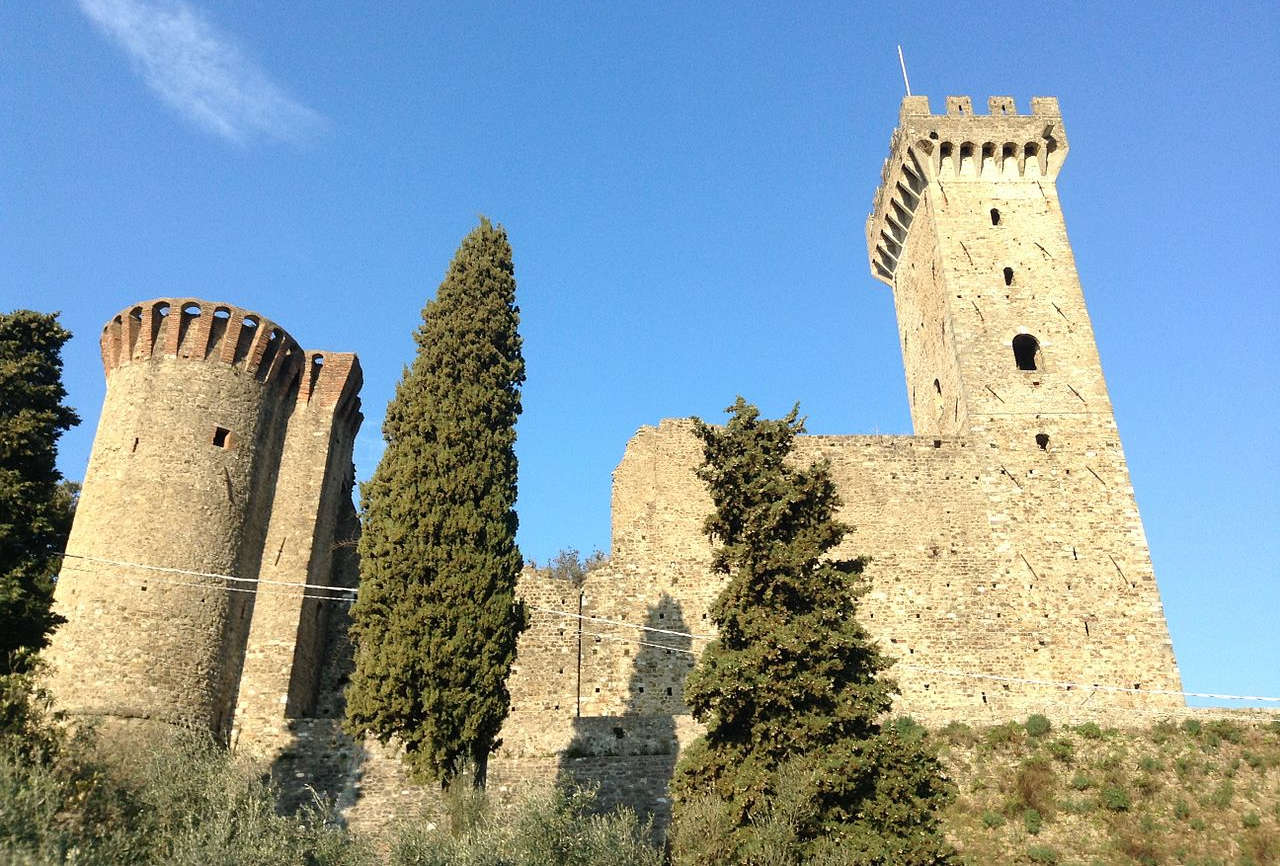
The alleged discovery: arcane documents and the subject of numerous publications, what they are, their history
The “two pages of the first edition of the Divine Comedy” are actually neither pages nor editions: in fact, both terms have been misused. This is a fourteenth-century parchment: at the time, printing had not yet been invented, so one cannot speak of an “edition,” since the term designates, precisely, a printed publication, while “pages” are those that make up a printed volume: the sheets whose photos have been circulated are instead manuscripts. Specifically, it is a fragment of a codex of the Commedia (with the end of Canto XXVI of Purgatorio, the incipit of XXVII, and verses 1-78 of XXVII), later used as a wrapper to a protocol of the notary Tommaso De Tomei, notarizing in the village of Nicola, near Luni, between 1542 and 1584.
The fragment was first made known as late as 1890 by Umberto Marchesini: at that time it was kept in the notarial archives of Sarzana. Since that date, there have been several mentions of the La Spezia fragment in the specialized literature, which has also been traced back to the Danti del Cento family of which the fragment in the State Archives of La Spezia seems to have the codicological characteristics, according to some scholars (the “Danti del Cento” are a group of Commedia codices produced in 14th-century Florence: formerly thought to be the work of a single copyist, while more recently the hypothesis that they are the product of a workshop has been raised). The image of the parchment presented in these hours as an “extraordinary discovery” has been published for more than a year on the page of the State Archives of La Spezia on the Ministry of Culture website.
As for the “original of the Pax Dantis,” that is, the documents concerning the peace of Castelnuovo, these are again strange documents, studied extensively, the subject of endless specialized literature, and even exhibited a few times. The last exhibition where the public was able to see them was held in 2021: the exhibition was titled Dante “nuncius specialis,” and the news is still posted on the website of the State Archives of La Spezia (from which you can also download a pdf with a flyer containing reproductions of the papers).
As explained in an online focus compiled by the La Spezia archive itself, the sheets on the peace of Castelnuovo are seven archival units (the oldest in the institution, moreover), which are part of a cartulary (a notarial register) from 1306 belonging to the notary Giovanni Parente di Stupio, rogante in Sarzana. The papers, as stated in the in-depth study, highlight “important facts and personalities of a historical period in which a dispute between potentates, the feudal and the ecclesiastical, was taking place in the territory of Sarzana, with an inevitable clash of interests on both the economic and political levels. The Papers in question, moreover, prove the presence of Dante Alighieri, since in his exile the supreme poet in Lunigiana and Val di Magra was hosted by the Malaspina family, known as the Ramo Secco.” The first of the papers, in particular, contains the mandatum, that is, the power of attorney conferred by Franceschino Malaspina of Mulazzo on Dante Alighieri, which he received on October 6, 1306, at the hands of the notary Giovanni Parente di Stupio in Piazza della Calcandola in Sarzana (today Piazza Matteotti). The second, third, and fourth papers, on the other hand, contain the so-called Instrumentum pacis, the text describing the peace between the Malaspina family and the bishop of Luni. The other papers, on the other hand, contain acts that resolved pending disputes still pending between the two sides.
The papers, as the State Archives declared on the occasion of the 2021 exhibition, are “of exceptional historical, paleographic and diplomatic value” and “document Dante’s role as a diplomat in the service of the Marquis Malaspina in settling patrimonial and legal disputes between the Malaspina and the Bishop-Count of Luni, Antonio di Nuvolone da Camilla dei Fieschi.” They have, moreover, recently been restored.
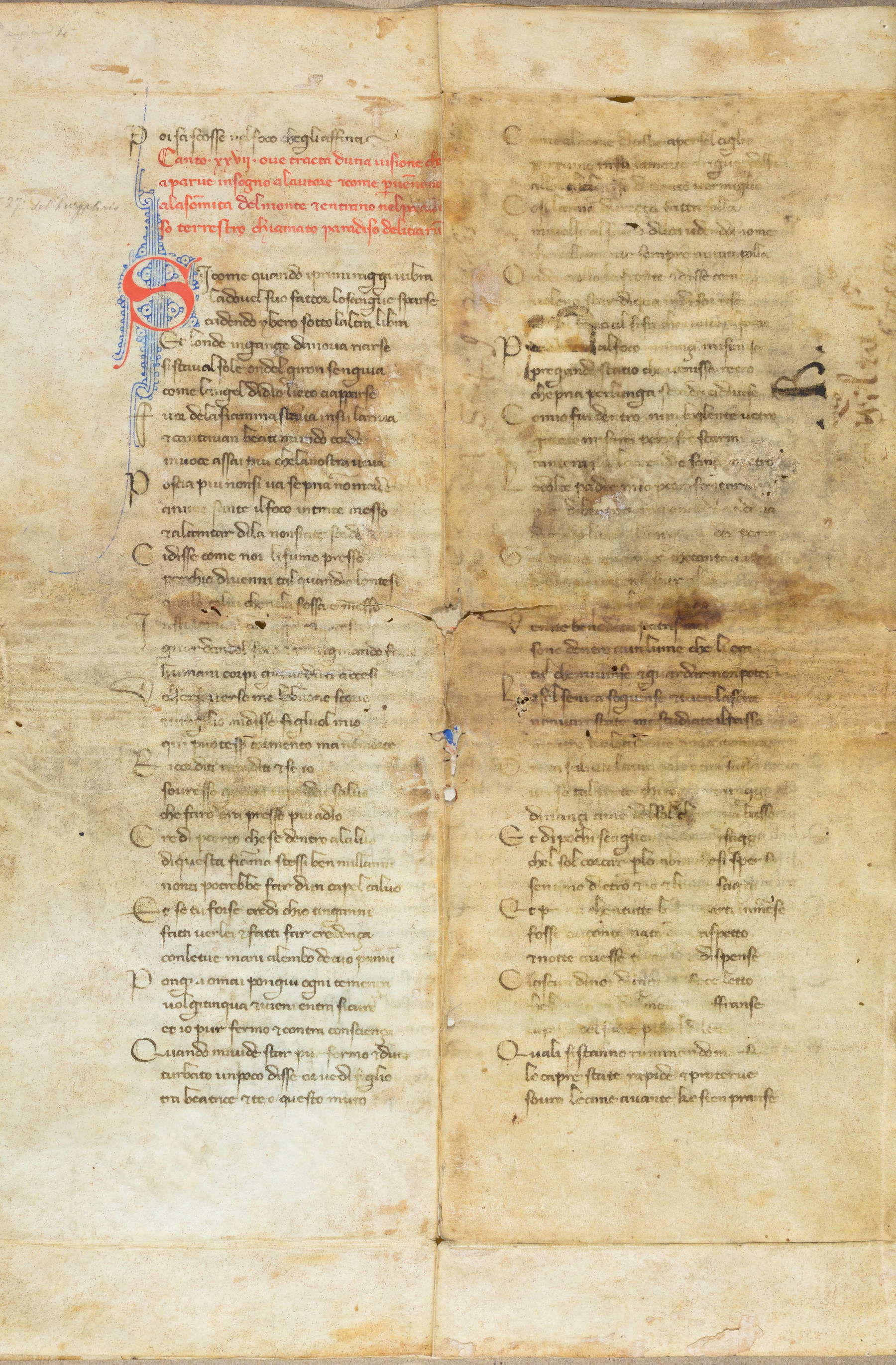
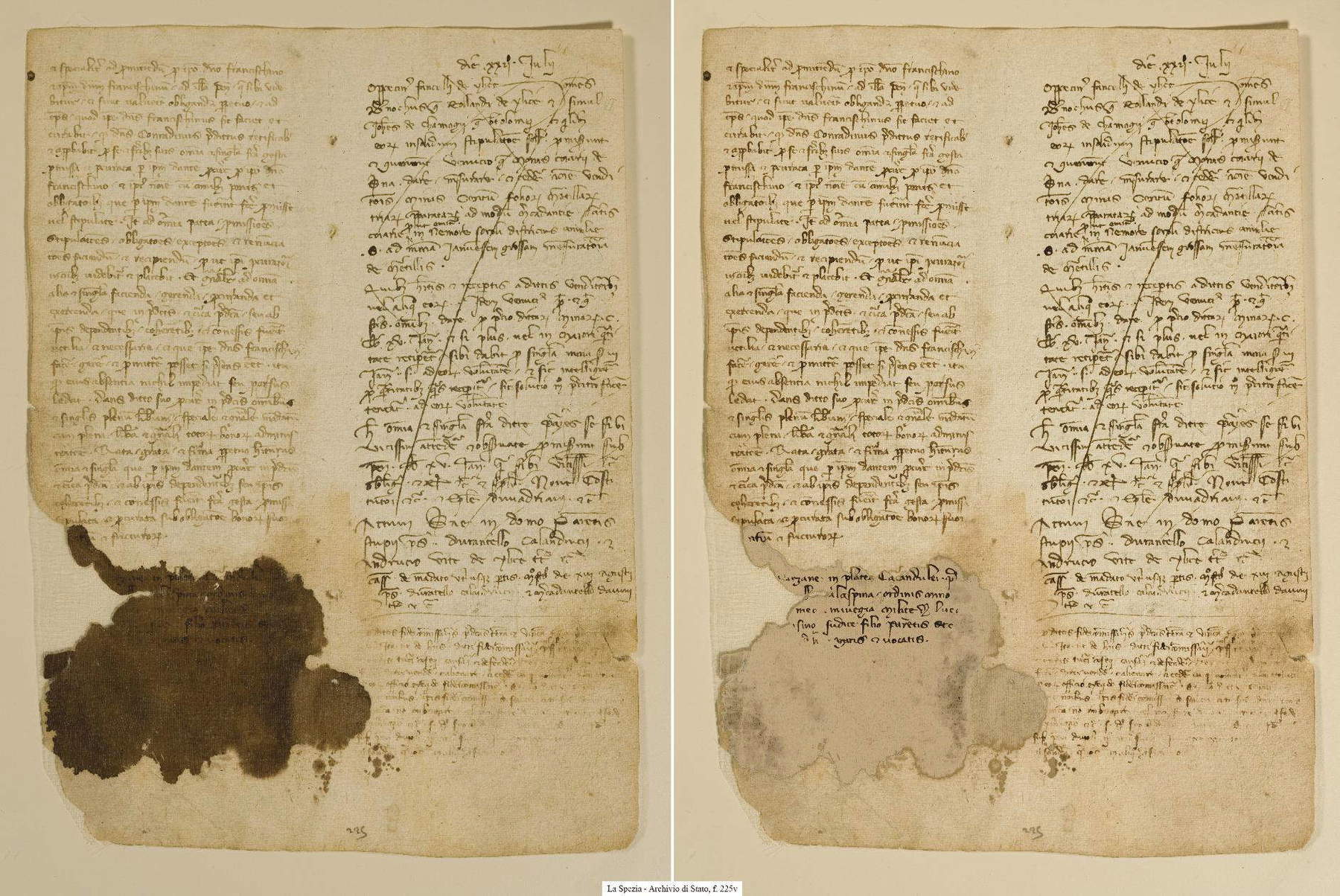
How did the blunder arise?
Where then did the incredible misunderstanding originate? On Saturday, Dec. 7, the mayor of La Spezia, Pierluigi Peracchini, published a post, attaching images of the archival documents, with this text: “A unique treasure of Dante Alighieri in La Spezia! In the State Archives of La Spezia we have a priceless heritage of the poet: the original of the Pax Dantis, which in 1306 ended the war between the Malaspina and the Bishops of Luni, and authentic pages of cantos from Purgatory and Paradise from the first edition of the Divine Comedy. I thank Director Rosetta Ferrara for the invitation to visit the State Archives and we will work together to expose these documents to the public in the near future!” Indeed, there is no reference in the first citizen’s post to any discoveries or findings. Read this way, it is simply an acknowledgement of a relevant presence in the La Spezia archives.
However, Ansa reports other less interpretable words from the mayor in a quotation mark: “it is an extraordinary fact, the discovery of a treasure of inestimable value. Now we intend to identify soon a path with the Ministry of Culture for an exhibition.” In short, it is unclear why these documents with which scholars have been familiar for decades and which have also been presented to the public, in the last few hours have... turned into newly found artifacts.
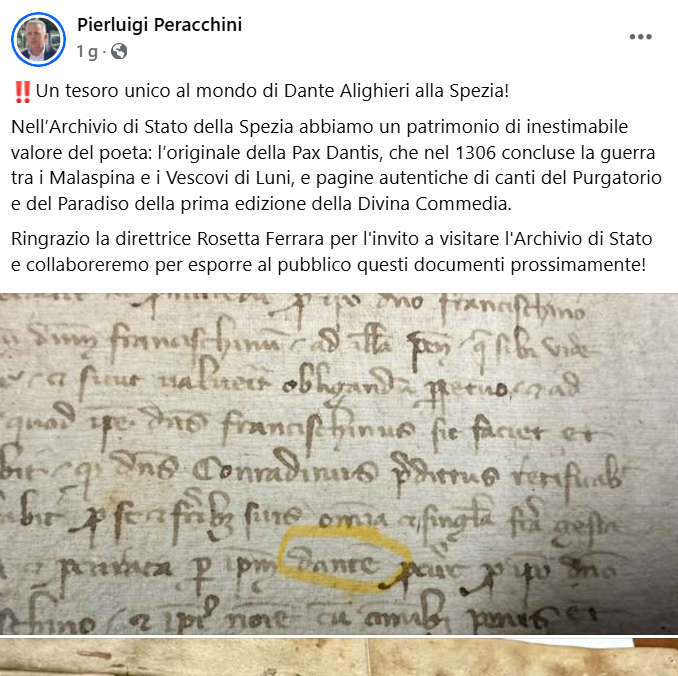
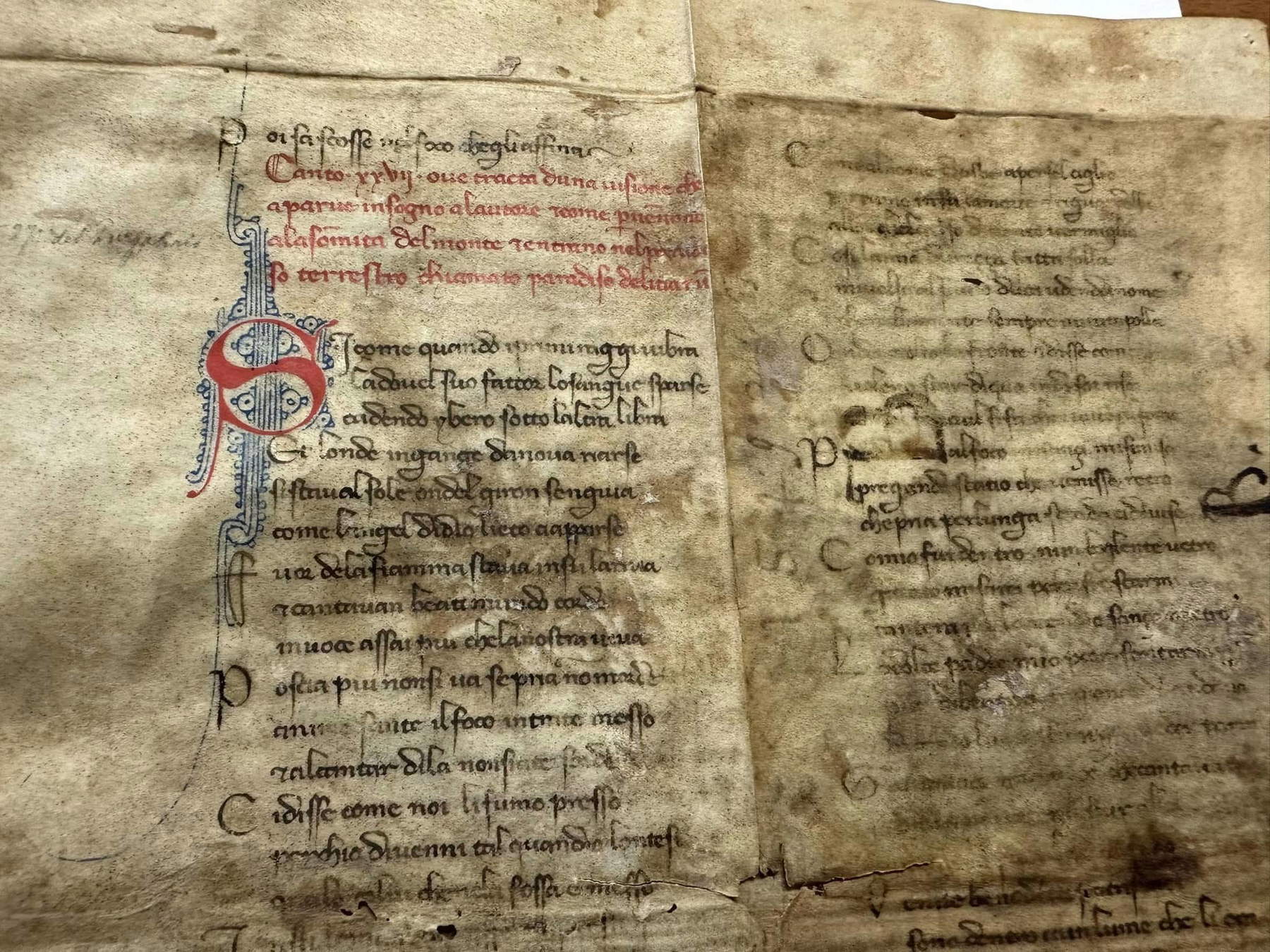
The reactions of scholars
Two scholars have already made their voices heard on social media amid the wave ofunfounded enthusiasm. The first to intervene was historian Enrica Salvatori, professor of Medieval History at the University of Pisa, with a post on her Facebook profile, reiterating that the papers have been known for some time. What has been produced in these hours, Salvatori later added in comments, is “an accumulation of errors.” “Dante’s so-called peace (I ignore why they use Latin) is composed of a series of different documents, notarial minutes, preserved in the only preserved file of a lost notarial register,” the scholar wrote. “They are documents in which Dante Alighieri acted as procurator of the Malaspina. There are not only those documents, but certainly those are the best known and MOST studied.” The Commedia parchment papers are “valuable specimens of the ’Danti del Cento,’ or C. group, a very rich section of codices of the Commedia, first thought to be the work of a single copyist, Francesco di Ser Nardo, but which recent studies have been able to assign to a writing workshop in Florence.”
The Castelnuovo Peace Papers, writes directly under the mayor’s post the expert Eliana Vecchi, who specializes in medieval archaeology, archivistics, paleography and diplomatics, and author of numerous publications on the ancient history of Lunigiana, became “a document-monument in 1906, after the anniversary ceremonies and a subsequent publication edited by Giovanni Sforza.” After that, they were "restudied in depth in 2006, with the ’release of an important volume of the Historical Journal of Lunigiana, edited together with the’ State Archives of La Spezia, which holds the ’Dante relics,’ as they were called. They were finally reissued recently in the Dantesque Diplomatic Codex. There are many displays of the tabulae, which have been placed, following restoration, since 2005 in more appropriate and secure cases, specially commissioned by the ’State Archives.“ Also ”the bifolium and parchment sheet, coming from a dismembered codex of the Divine Comedy and used later as the cover of a cartulary, had already been edited in 1890 and Giosuè Carducci came to see them at the Sarzana Notarial Archives where they were then preserved."
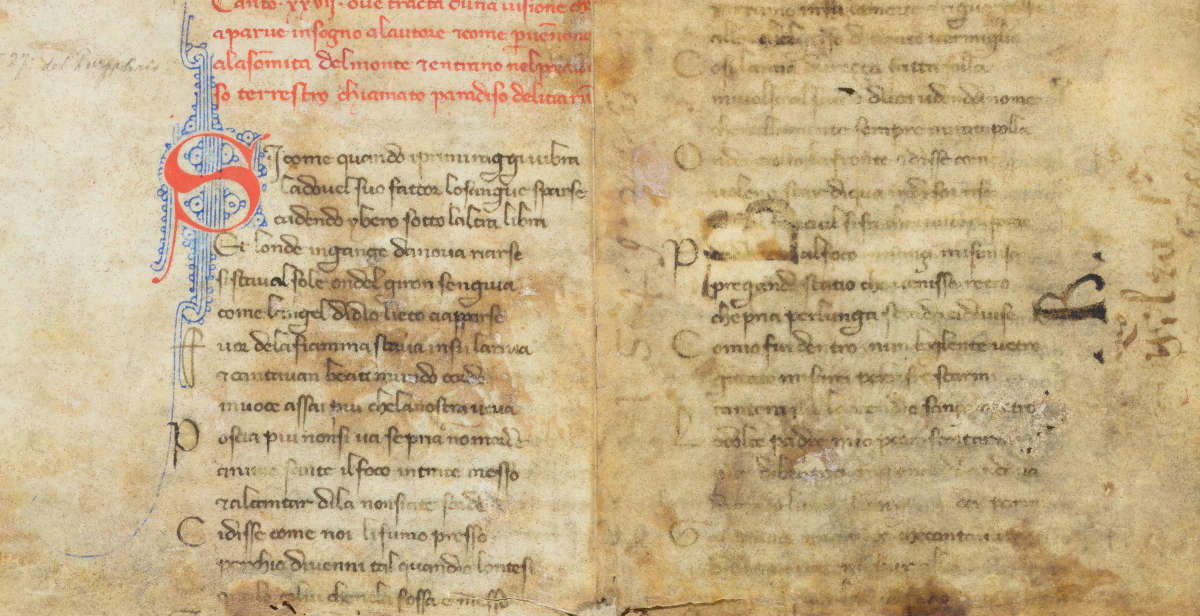 |
| La Spezia, extraordinary discovery? No, glaring blunder: the papers on Dante "found"-they are strange! |
Warning: the translation into English of the original Italian article was created using automatic tools. We undertake to review all articles, but we do not guarantee the total absence of inaccuracies in the translation due to the program. You can find the original by clicking on the ITA button. If you find any mistake,please contact us.



























